- Home
- Clarice Lispector
An Apprenticeship or the Book of Pleasures Page 2
An Apprenticeship or the Book of Pleasures Read online
Page 2
It was still too early to turn on the lights, which at least would hasten the night. The night that wouldn’t, and wouldn’t, and wouldn’t come, that was impossible. And her love that now was impossible — that was dry the way the fever of someone who doesn’t sweat was love without opium or morphine. And “I love you” was a splinter you couldn’t remove with tweezers. A splinter buried in the toughest part of the sole of your foot.
Ah, and the lack of thirst. Heat with thirst would be bearable. But ah, the lack of thirst. There was nothing but lacks and absences. And not even will. Just splinters with no protruding ends by which to pluck and expel them. Only the teeth were moist. Inside a voracious and parched mouth the moist but hard teeth — and especially the mouth voracious for nothingness. And the nothingness was hot on that late afternoon eternalized by the planet Mars.
Her eyes open and diamond. On the roofs the dry sparrows. “I love you, people,” was an impossible phrase. Humanity for her was like eternal death that nevertheless hadn’t had the relief of finally dying. Nothing, nothing was dying on that parched afternoon, nothing rotting. And at six o’clock it was like noon. It was noon with a watchful noise from a water pump’s motor, a pump that had been working for so long without water and that had become rusted iron: for two days there had been no water in different parts of the city. Nothing had ever been as awake as her body without sweat and her diamond eyes, with all vibration stilled. And the God? No. Not even the anguish. Her chest empty, not contracted. There was no scream.
Meanwhile it was summer. An expansive summer like the empty playground during school holidays. Pain? None. No sign of a tear and no sweat. No salt. Just a heavy sweetness: like that of the slow hides of the elephants made of dried-out leather. The limpid and hot squalor. Think about her man? No, that was the splinter in the heart-bit of the foot again. Regret not having married and not having children? Fifteen children hung on her, without swinging in the absence of wind. Ah, if only her hands would start growing moist. Even if there were water, out of hatred she wouldn’t wash. It was out of hatred that there wasn’t water. Nothing was flowing. The difficulty was a motionless thing. It’s a diamond jewel. The cicada with its dry throat wouldn’t stop growling. And what if the God finally liquefies into rain? No. I don’t even want that. Out of calm dry hatred, this is what I want, this silence made of heat that the tough cicada makes you feel. Feel? There’s nothing to feel. Except this hard lack of the opium that soothes. I want this intolerable thing to keep going because I want eternity. I want this ongoing waiting like the red song of the cicada, because all this is the halted death, it’s the Eternity of trillions of years of stars and of the Earth, it’s rutting without desire, dogs without barking. It’s at this time that good and evil don’t exist. It’s the sudden forgiveness, we who nourish ourselves with the secret pleasure of punishment. Now it’s the indifference to forgiveness. For there is no more judgment. It’s not a forgiveness that comes after a judgment. It’s the absence of judge and felon. And it’s not raining, not raining. Menstruation doesn’t exist. The ovaries are two dry pearls. I’ll speak the truth to you: out of dry hatred, that’s exactly what I want, and for it not to rain.
And just then she hears something. A thing dry too that leaves her even drier of attention. It’s a roll of dry thunder, without a drop of saliva, that rolls, but where to? In the naked and absolutely blue sky there’s not a cloud of love crying. The thunder must be very far away. At the same time the air has a sugary scent of big elephants, and of sugary jasmine from the house next door. India invading Rio de Janeiro with its sugary women. A scent of cemetery carnations. Would everything change so quickly? For someone who had neither night nor rain nor rotting of wood in water — for someone who had nothing but pearls, would night really fall? Would there be wood rotting at last, carnations living off rain in the cemetery, rain that comes from Malaysia?
The urgency is still motionless but already has a trembling inside it. Lóri doesn’t realize that the trembling is her own, as she hadn’t realized that what was burning her wasn’t the hot dusk, and instead her own human heat. She only realizes that now some thing will change, that it will rain or night will fall. But she can’t bear the wait for a change, and before the rain falls, the diamond of her eyes liquefies into two tears.
And at last the sky softens.
Lóri called his number:
— I can’t come, Ulisses, I’m not well.
There was a pause. He finally asked:
— Physically not well?
She answered that it was nothing physical. Then he said:
— Lóri, said Ulisses, and suddenly he seemed serious though he was speaking calmly, Lóri: one of the things I’ve learned is that we ought to live despite. Despite, we should eat. Despite, we should love. Despite, we should die. It’s even often this despite that spurs us on. The despite was what gave me an anguish that when unsatisfied was the creator of my own life. It was despite that I stopped on the street and stood looking at you while you were waiting for a taxi. And immediately desiring you, that body of yours that isn’t even pretty, but it’s the body I want. But I want it all, including the soul. That’s why it doesn’t matter that you’re not coming, I’ll wait as long as I have to.
— Why didn’t you ever marry? she asked out of the blue.
— Because — and his voice was the voice of someone smiling — because I never felt the need to and luckily I had the women I wanted.
She said goodbye, bowed her head with modesty and joy. For despite, she’d had joy. He’d wait for her, she knew that now. Until she learned.
Everything was calm now. And as she remembered her own Biblical image, as she’d looked in the mirror before, she found it so somehow lovely, that she had to give this aspect of beauty to someone. And that someone could only be Ulisses who knew how to see the disguised and innermost beauty that a common person couldn’t. But he, at a glance, could. He was a man, she was a woman, and a miracle more extraordinary than this could only be compared to the falling star that crosses the black sky almost imaginarily and leaves as its trail the vivid amazement of a living Universe. He was a man and she was a woman.
She who had so often reached the point of hating Ulisses, even while still getting him to want her.
Ah! she screamed suddenly mute, may the God help me achieve the impossible, only the impossible matters to me!
She didn’t even understand what she meant by this, but as if she had been heard in her greatest human plea and somehow, just by wanting it, had touched the impossible, she said quietly, audibly, humbly: thank you.
Through her grave defects — which she might one day be able to mention without boasting — she had now come to be able to love. Even that glorification: she loved the Nothing. The awareness of her permanent human fall was leading her to the love of the Nothing. And those falls — like those of Christ who fell several times beneath the weight of the cross — and those falls were what were starting to make her life. Maybe it was her “despites” that, Ulisses had said, despites full of anguish and lack of understanding of herself, were leading her to build bit by bit a life. With stones of poor material she might have been building the horror, and accepting the mystery of with horror loving the unknown God. She didn’t know what to do with herself, already born, except this: Thou, the God, whom I love like one falling into the nothing.
After that it was easy to call Ulisses and tell him she’d changed her mind and he could wait for her in the bar. What she was doing to herself was cruel: taking advantage of her raw living flesh in order to get to know herself better, since the wound was open. But it hurt too much to head in that direction. So she preferred to calm down and decided that, in the taxi, she’d think about Ulisses’s straight nose, his face marked by the slow apprenticeship of life, his lips that she’d never kissed.
Except she didn’t want to go empty-handed. And as if she were bringing him a flower, she wrote on a piece
of paper some words that would give him pleasure: “There’s a being who lives inside me as if it were his house, and it is. It’s a black and shiny horse that despite being completely wild — for it never lived in anyone before nor has anyone ever bridled and saddled it — despite being completely wild it has for precisely that reason the primal sweetness of someone who is not afraid: sometimes it eats from my hand. Its muzzle is moist and fresh. I kiss its muzzle. When I die, the black horse will lose its home and suffer a lot. Unless he chooses another house and that other house isn’t afraid of something at the same time wild and tender. I should mention that he has no name: just call him and you’ll get his name right. Or not, but, once he’s been called with sweetness and authority, he’ll come. If he sniffs and feels that a house-body is free, he’ll trot without a sound and come. I should also say that you shouldn’t fear his whinnying: people make the mistake of thinking they’re the ones whinnying with pleasure or rage, people take fright at the excess of sweetness which this is for the first time.”
She smiled. Ulisses would like it, he’d think she was the horse. Was she?
As if a herd of transparent gazelles were passing through the air of the world at dusk — that’s what Lóri managed some weeks later. The translucid victory was as light and promising as pre-sexual pleasure.
She’d become more skillful: as if slowly getting used to the Earth, the Moon, the Sun, and strangely to Mars most of all. She was on a terrestrial platform from which for split seconds she seemed to see the super-reality of what is truly real. More real — Ulisses said to her when she in her own way told him about the almost non-event — more real than reality.
The next day she patiently tried dusk again. She was waiting. With her senses sharpened by the world that surrounded her as if she were entering Venus’s unknown lands. Nothing happened.
LUMINESCENCE . . .
From Ulisses she’d learned to have the courage to have faith — lots of courage, faith in what? In faith itself, since faith can be a real scare, it can mean falling into the abyss, Lóri was afraid of falling into the abyss and was holding on to one of Ulisses’s hands while Ulisses’s other hand was pushing her into the abyss — soon she’d have to let go of the hand that was weaker than the one pushing her, and fall, life isn’t a joke because in the middle of the day you die.
A human being’s most pressing need was to become a human being.
And there was the night of terror. She kept hearing footsteps coming and going. She peeked out of a gap between the blinds and saw it was the same half-crazed man, with long monkey arms, who’d followed her that day. His slow steps were coming and going and returning. Lóri knew he was waiting for her. Through the blinds she saw that he was smoking and patiently walking back and forth.
She couldn’t bear it any longer and called Ulisses. He said he’d be there in minutes. Minutes or interminable hours? Had his car’s brake cable broken or something like that?
Finally she heard his car stop. From the window she saw the two men talking, and a calm whisper that was carrying on too long.
At last she saw the man go away, at the same time that Ulisses was saying to her in a low voice:
— Lóri, it’s fine. It was a man you looked at quite a bit today, maybe you didn’t realize, and he followed you hopefully, hoping you’d open the door.
— Come to the door.
He came:
— Would you like a coffee? She asked as a pretext to get him to come in.
He stayed on the threshold. She was standing, in a short and transparent nightdress. He was going to say: “you can sleep easy now, I found a way to get him to go.” But before he said that he stopped short, his lips pursed, and looked her up and down. Finally he said:
— I’ll call in the morning.
With the despair of a woman scorned, she heard his car pull away.
Ulisses’s gaze robbed her of sleep. She looked herself all over in the mirror in order to figure out what Ulisses had seen. And she found herself attractive. Yet he hadn’t wanted to come in.
She waited unhurriedly for dawn. The best light for living was at dawn, faint such a faint promise of early morning. She knew that, had experienced it countless times. Like a painter who seeks the light most suited to him, Lóri preferred for the discovery of what’s called living those shy hours at the vague start of the day. At dawn she’d step onto her little terrace and if she was lucky it would be dawn with a full moon. She’d learned all this through Ulisses. In the past she’d avoided feeling. She still did but now with short incursions into life.
But she didn’t fear the moon because she was more lunar than solar and could see with wide-open eyes in the dark dawns the sinister moon in the sky. So she bathed all over in the lunar rays, as there are others who sunbathed. And was becoming profoundly limpid.
In this cool dawn she went to the terrace and reflecting a bit came to the frightening certainty that her thoughts were as supernatural as a story that takes place after death. She had simply felt, suddenly, that thinking wasn’t natural for her. After that she’d reached the conclusion that she didn’t have a day-to-day but a life-to-life. And that life that was hers in the dawns was supernatural with its countless moons bathing her in such a terrible silver liquid.
More than anything she’d now learned to approach things without linking them to their function. It now seemed she could see how things and people would be before we gave them the meaning of our human hope or our pain. If there were no humans on earth, it would be like this: it would rain, things would get drenched, alone, and would dry and then burn drily under the sun and get toasted in the dust. Without giving the world our meaning, how frightened Lóri was! She was scared of the rain when she separated it from the city and the open umbrellas and the fields soaking up the water. Then the thing she called death would attract her so strongly that she could only call bravery the way in which, out of solidarity and pity for others, she was still bound to what she called life. It would be profoundly amoral not to wait for death as all others wait for that final hour. It would have been sneaky of her to leap ahead in time, and unforgivable to be cleverer than others. For that reason, despite her intense curiosity about death, Lóri was waiting.
Morning broke.
Whatever had happened in Lóri’s thought in that dawn was as inexpressible and incommunicable as the voice of a hushed human being. Only the silence of a mountain was comparable. The silence of Switzerland, for example. She remembered fondly the time when her father was rich and they’d travel for several months a year.
As intransmissible as humans were, they were always trying to communicate with gestures, with stutters, with badly said words and bad words. Morning was already well underway when she made strong coffee, drank it and got ready to communicate with Ulisses, since Ulisses was her man. She wrote:
“Night is so vast in the mountains. So uninhabited. The Spanish night has the scent and the hard echo of the tap dance, the Italian night has the warm sea even in its absence. But the night of Bern has the silence.
“We can try in vain to read so as not to hear it, to think quickly so as to disguise it, to invent a plan, a fragile bridge that barely connects us to the suddenly improbable next day. How to get beyond the peace that lies in wait for us. Mountains so high that despair becomes bashful. The ears prick, the head bends, the whole body listens: not a sound. No possible rooster. How to be within reach of that profound meditation of silence? Of this silence without memory of words. If thou art death, how to bless thee?
“It’s a silence, Ulisses, that doesn’t sleep: it’s insomniac: immobile but insomniac and without ghosts. It’s terrible — not a single ghost. It’s useless to want to populate it with the possibility of a door that opens with a creak, of a curtain that opens and ‘says’ something. It’s empty and without promise. Like me, Ulisses? If at least there were wind. Wind is rage, rage is life. But during the nights I spent in Bern there was
no wind and every leaf was inlaid on the branch of the immobile trees. Or it was the time of year for snow. Which is silent but leaves a trace — everything turns white, children laugh playing with the flakes, footsteps creak and leave prints. This is so intense during the day that the night is inhabited still. There’s a continuity that is life. But this silence doesn’t leave evidence. You can’t speak of silence the way you speak of snow. Silence is the profound secret night of the world. And you can’t speak of silence the way you speak of snow: have you felt the silence of those nights? No one who has heard tells. There’s a freemasonry around the silence that consists of not speaking of it and of worshipping it without words.
“Night falls, Ulisses, with the little joys of someone turning on the lights, with the fatigue that does so much to justify the day. The children of Bern fall asleep, the last doors are closed. The streets shine on the paving stones and shine already empty. And finally the lights in the houses go out. Just the odd lit streetlight to illuminate the silence.
“But that first silence, Ulisses, is not silence yet. Wait a bit, because the leaves on the trees will adjust their positions, some belated footstep might be heard going hopefully up some stairs.
“But there’s a moment in which from the rested body the watchful spirit rises, and from the Earth and the Moon. Then it, the silence, appears. And the heart quickens in recognition: for it is the silence inside us.
“You can quickly think of the day that passed. Or of the friends that passed and were lost forever. But it’s no use to try to avoid it: the silence is there. Even the worst suffering, that of lost friendship, is just an attempt to escape. For if at first the silence seems to expect a reply — what an urge, Ulisses, to be called and to respond; soon you discover that it demands nothing of you, perhaps only your silence. But the members of the masonic order know this. How many hours I wasted in the dark supposing that silence judges you — how I waited in vain to be judged by the God. Justifications arise, tragic fabricated justifications, humble apologies to the point of indignity. It’s so pleasant for human beings to show at last their indignity and be forgiven with the excuse that humans are humiliated beings from birth.

 The Stream of Life
The Stream of Life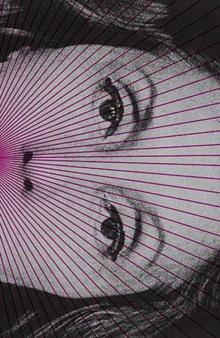 The Complete Stories
The Complete Stories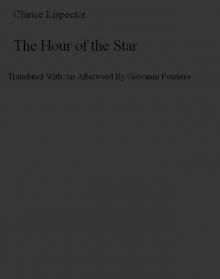 The Hour of the Star
The Hour of the Star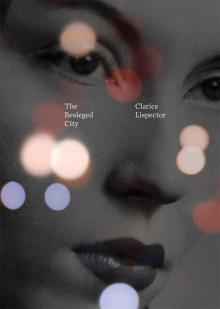 The Besieged City
The Besieged City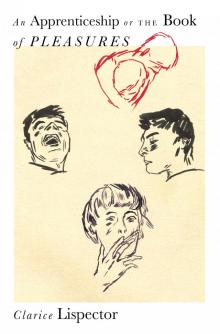 An Apprenticeship or the Book of Pleasures
An Apprenticeship or the Book of Pleasures The Chandelier
The Chandelier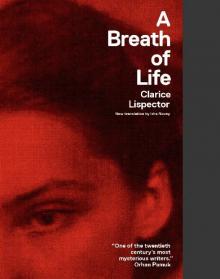 A Breath of Life
A Breath of Life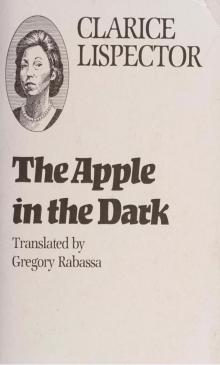 The Apple in the Dark
The Apple in the Dark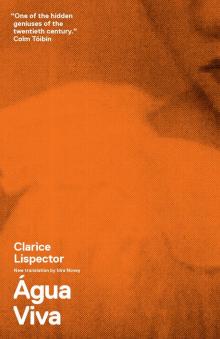 Agua Viva
Agua Viva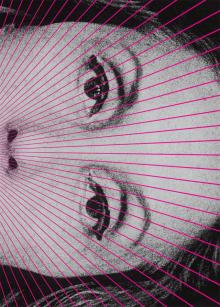 Complete Stories
Complete Stories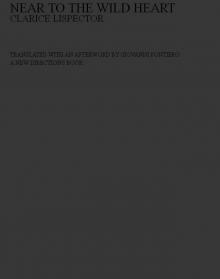 Near to the Wild Heart
Near to the Wild Heart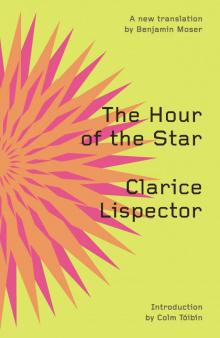 The Hour of the Star ()
The Hour of the Star ()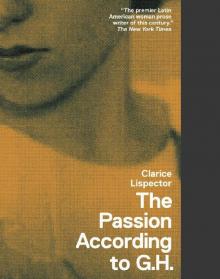 The Passion According to G.H.
The Passion According to G.H.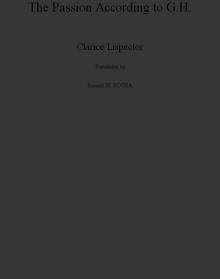 The Passion According to GH
The Passion According to GH